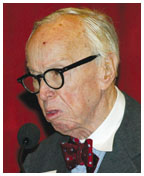

Arthur Schlesinger, Jr., who died on Wednesday, was the first serious historian I ever read, back when I was in junior high school.
My first Schlesinger book was A Thousand Days, his account of the Kennedy Administration, of which he had been a minor White House functionary. No doubt Kennedy, himself a Pullitzer Prize winner in history--although there are those who believe that speechwriter Ted Sorenson was the actual author of his Profiles in Courage--wanted Schlesinger, renowned for his works on Andrew Jackson and Franklin Roosevelt, close at hand to chronicle his presidency. But Kennedy probably also thought that he and Schlesinger would pen the account together. The tragic events of November 22, 1963 put an end to that plan.
The account that Schlesinger produced without Kennedy can rightly be criticized as being more hagiography than biography. But one shouldn't be too critical of him for that. Other members of the Kennedy Administration produced similarly worshipful books at almost the same time, most notably Sorenson and press secretary Pierre Salinger. Given the assassination of Kennedy and the sense of lost promise they all carried, that's probably to be expected. Their approach, that of casting their boss as a hero worthy of a place on Mount Rushmore, isn't unique among the volumes produced by presidential subordinates, before or since.
But even in A Thousand Days, Schlesinger applied the three elements that seemed to characterize almost all of his work:
- the novelist's gift with words;
- meticulous scholarship (It was Schlesinger who caused me to fall in love with the footnote.); and
- an intense commitment to the liberal tradition in Democratic Party politics.
But this intensely partisan and deeply liberal academic could also be a pragmatic pol. Like John Kenneth Galbraith, another Harvard scholar, Schlesinger never lost his love for Adlai Stevenson, the Illinois politician who had the misfortune of facing Dwight Eisenhower in both 1952 and 1956, when he was overcome by electoral landslides. To the end of his days, Schlesinger contended that Stevenson would have made a great President. But when Stevenson made a third run at the Democratic presidential nomination in 1960, Schlesinger (and Galbraith) made the calculation that an unambiguous liberal like Adlai, who had already lost twice, wouldn't be as palatable to the American people as a fresh-faced, World War Two veteran who was less than enthusiastic about civil rights and had a tough record as a Cold Warrior. He supported Kennedy for President, bringing many of his Americans for Democratic Action (ADA) friends in tow.
In more recent years, Schlesinger served as general editor of the wonderful New York Times series of books on US Presidents. The old master did a great job!
Each volume is about 150-pages in length, providing scant details on the lives of the chief executives before their terms and after, if they survived them. The focus of each was the periods of their presidencies.
I love this series, although not every volume is a homerun. Hans L. Treffouse, for example, could have provided more information on Rutherford B. Hayes, rather than assuming that readers knew more of the background of this obscure President than is likely the case.
Robert V. Remini, known more for his work on Andrew Jackson and Henry Clay, was, I thought, intensely unfair to John Quincy Adams and his admittedly prickly family.
But Schlesinger's selection of who should author the various books bordered on the inspired.
He picked John Dean, Marion, Ohio-native and the Nixon adviser whose testimony unraveled the 37th. President's scandal-plagued Administration, to write the story of Marion, Ohio native Warren Harding's posthumously scandal-plagued presidency.
Roy Jenkins, the British politician and eminent Churchill biographer, was selected to write about Franklin Roosevelt's White House tenure.
Novelist E.L. Doctorow, with his appreciation of the ironic, of history, and of the poetic in life, was assigned the account of Abraham Lincoln's administration.
Tom Wicker, the Times correspondent who had covered Eisenhower's presidency, critically, wrote a volume on Ike's tenure that was, with the benefit of passing years, surprisingly appreciative.
John Siegenthaler, the Tennessee journalist who served in the Kennedy Justice Department, wrote the volume on Tennesseean James K. Polk, who probably worked himself into an early grave through his control freak approach to the presidency.
Today on NPR, I heard historian Robert Dallek say that Schlesinger never expected that what he wrote would be the definitive accounts of any era or any historical figure. Historians always debate and revise, he knew. Schlesinger's judgments will be questioned. But his scholarship never will be. And, I think, anywhere people appreciate language, his writing will continue to be enjoyed.
No comments:
Post a Comment